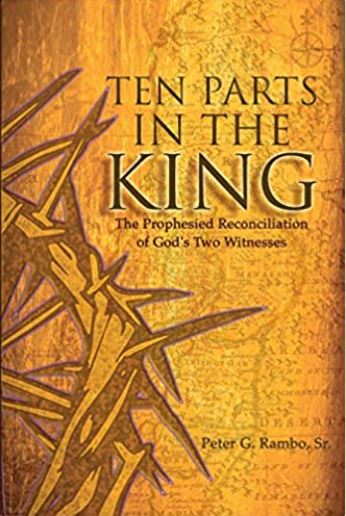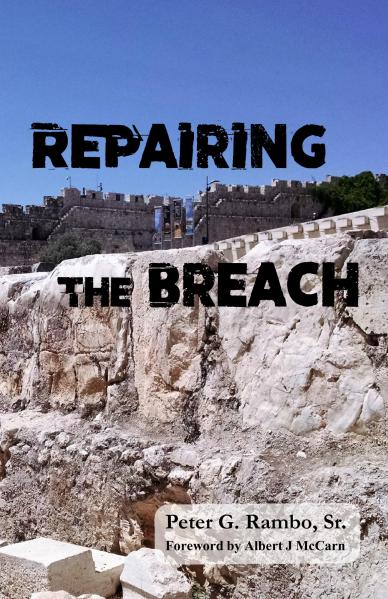Third part in a series… I recommend the previous parts as background. Part 1. Part 2.
[The short, as a pastor, I have had an email exchange sharing my changing theological position as Yahweh opens my eyes to the fullness of His Word. I hope these emails help others in formulating reasoned loving and grace filled responses to those questioning what and why you are learning/growing in your understanding of the Hebrew roots of your faith in a Jewish Messiah.]
This is an email to the ordaining body for my area in my denomination. In the email, I actually enclose an email that was to another pastor in this area. Names are redacted to protect the innocent…
Enjoy.
Committee Chair….,
Thank you very much for your reply. I am available most every Tuesday and Thursday for lunch. I’d be happy to meet here or in Cola. Those are my days off and I do not mind driving.
As additional thoughts and background, I am pasting in a letter I wrote today in a running discussion I am having with someone. He gave me Philip Ross’ From the Finger of God. The nature of the book being germain to our discussion, I thought this appropriate.
Blessings,
Pete
___________
Letter to another local pastor from a different denomination….
Redacted,
Thanks for loaning Philip Ross’ From the Finger of God to my son. I had a chance to read a good portion of it last night and have a few thoughts I want to share.
Ross does an excellent job of compiling theological opinion from many stripes about the three-fold division of the Law. Clearly, he has read well and thought deeply on the subject.
Again, I did not read all of the book, but covered much more than half and in my opinion, he leaves several very large stones unturned.
The early history of the church as well as world history demonstrates two important issues that are rarely dealt with.
1. The significant anger of the Romans toward the Jews that boiled into heavy antisemitism and ethnic persecution. This intern boiled over onto the young church (viewed as a sect by the Jews) and the newly grafted-in believers.
2. The influx of Greek-minded (Western) leaders/bishops with little understanding or desire to understand Hebrew (Eastern) thought processes, while those rooted in the culture, language and mindset of the scriptures were shuffled to the back of the bus and eventually, completely off of the bus.
The combination of these two factors led the young church to be very intentional in severing any cultural ties to its roots, presumably to avoid persecution. As this severing progressed, justification had to be made for eliminating anything that even remotely smelled of ‘Jewishness,’ regardless of how Scripture portrayed it. Thus, even today, we speak of the Feasts of the Lord as ‘Jewish customs’ when Scripture declares they are something entirely different. The same can be said for other commandments that have been justified into categories that are ‘abolished,’ ‘annulled,’ ‘abrogated,’ etc. I would argue that this began the creation of a religion and all the attendant power structures with which the young papacy became drunk.
While I do believe the Hebrew mind, and Scripture itself, points to gradients of Law, that same Hebrew mind could only speak of it as a complete code that could not be parsed into categories that would be abolished. That is why, even according to Ross, there are many references to the Law in the NT that have to be understood as the Law as a whole. To do otherwise does damage to the whole and strains the meaning of the text.
Ross addresses (I forgot the page #) what appears on the surface to be an inconsistency between Messiah and the Law when in Matthew 5:38-42 Jesus teaches, “You have heard it said ‘An eye for an eye, a tooth for a tooth,’ but I say to you do not resist an evil person; but whoever slaps you on your right cheek, turn to him the other also, if someone wants to sue you and take your shirt, let him have your coat also…” He misses a most important point!! The Greek mind must square these two statements and so the solution they (we) come up with is, ‘Oh, He must be changing the Law.’ The problem is the Eastern/Hebrew mind, unlike ours, has no problem holding apparently disconsolate ideas in tension. Understanding that, I would say, “He is not changing or overturning the Law, rather He is teaching that in the face of the existing law, we should react with love and mercy. Leave the vengeance to our Father in heaven.” Under the Law we have a right to vengeance, however, we do not have to take it. If anything, the existence of the Law (and our lawful right) highlights the sacrifice made, thus pointing to the reason why we do not take vengeance. The same is true and directly applicable to our lives today.
There are other examples that are very similar and the author does not consider that there may be a solution outside of his box.
Admittedly, there are obvious laws that are tied to the land, or to theocratic Israel. The historical box is, “Theocratic Israel does not exist, therefore those laws are null and void.” I grant the Puritans a pass on this because they could not in any meaningful way conceive of a future physical fulfillment prior to the return of the King. Does this make the Law void or merely inactive? There is a big difference. I do not recall Ross exploring this simple and elegant solution. Judah was exiled to Babylon and during that time could not offer sacrifices properly in the absence of the Temple. Did they declare the laws void or merely suspended? (Understand, I do not think that we will see a re-institution of the stoning laws. I’m a combat vet and can’t stomach the idea, however, nowhere does that give me permission to declare what Jesus said would stand ‘until Heaven and earth pass away’ as abrogated. I would even argue that He would prevent a Sanhedrin from issuing that order… but no need to worry about that now as a proper Sanhedrin with true Levites can’t be convened anyway. Cross that bridge if/when we get there, but I do have an idea….) I would argue that a number of laws are suspended and in my Greek infused mind I do not like the loose thread, but it is a significantly safer solution than countermanding the very words of our Lord.
A second pass that I offer the Puritans, though only slight, is the antisemitism inherited from Calvin and Luther which they tracked into the Protestant Reformation from a flamingly antisemitic RCC. Interestingly, the Puritans were not big fans of Christmas and Easter. Did they understand the pagan roots that predate Christ by over a 1000 years? I would argue, yes! Our Pilgrim forefathers not only outlawed Christmas with attendant penalties, but they instituted a holiday not entirely unlike Succoth, the Feast of Booths… Thanksgiving. With the research tools we have today, I believe those same men, with spines of steel, would have faced down these two holidays with their passion for pure worship.
Elsie,*(changed) in her paper on homosexuality, makes a significant observation: “(paraphrasing) Some homosexuals say that since parts of the Levitical law have been abrogated, then they have a right to declare parts dealing with their homosexuality also done away with.” Astute! And, a major indictment against any who would alter the law without clear Scriptural reason. I say, “No sacrifices because Scripture says it is unlawful without Levites and a Temple.” The one who divides the Law says, “No sacrifices because it seems to me that the Law is divided and that part is done away with” thus opening the door for any yahoo to divide the law to his/her own liking. Even Ross admits it is often hard to determine which category different laws fit in and therefore how they may/may not apply. Do we not do damage to our testimony by declaring parts of the Law to be annulled when scripture nowhere teaches such? By declaring laws abrogated do we not open the door for others to pick and choose according to their own proclivities? Is it not significantly stronger footing to understand them as suspended?
Now, about Hebrews: Yep, always goes to sacrifice. A few thoughts, but, in my opinion, the solution is fairly simple: It takes the whole book of Hebrews to explain one simple change in the Law, prophesied in the OT. (Amos 3:7 seems to teach that any change or action of the Lord is prophesied…) Jesus, identified as the perfect atoning sacrifice, is now the Perfect High Priest according to the Order of Melchizedek. V. 7:11-13 articulate that the priesthood was imperfect and that a change (metatithemi see 11:5, translation) of the law (v.18 identifies this as a single commandment, not the whole law) was required to install a perfect High Priest. Hebrews 8:8 demonstrates that the fault is with the priesthood (see ‘them’) and the effect is a ‘renewed’ covenant. Verse 8:4 even declares that if Jesus “were on earth he would not be a priest at all, since there are those who offer the gifts according to the Law.” The author of Hebrews admits an ongoing lawful function of the Temple and some aspect of the sacrificial system. ( http://q.b5z.net/i/u/10105283/f/FAQ_-_Hebrews_7-8.pdf ) Ezekiel 44:10-11 as well as Revelation 7:15 seem to point to a future priesthood and sacrifice, though the nature of the sacrifice is not spelled out. (Also it is not clear whether these are millennial or post-millennial, though a fair guess would be Ezekiel is millenial and Rev. post… Yes, we are all priests, but there seem gradients of reward and approach that are supported in other ways… related rabbit trail we don’t take). So, does Hebrews teach that all sacrifice is done away with, or just the atoning sacrifices? Can we assume all if only the atoning sacrifice is dealt with? Paul, in Acts 21:23-24, participates in sacrifice ritual that was not atoning in nature. (Numbers 6) Surely he would never have done this if that aspect was ‘done away with.’ Particularly if he is author or contributor to Hebrews.
A further complication to the Ross argument is that he never deals with Isaiah 66:17, 23 or Zechariah 14:16ff. I would love to hear his comments on those two clear examples of ceremonial law in some future time. The Reformed position of writing them off as wholly changed or redefined is altogether unsatisfying. The Hebrew authors knew full-well what those passages mean, but we have to do violence to them by spiritualizing them (a bad habit for the Greek mind whenever it can’t put the thought in a neat box). The clear text and context, though prophetic, is decidedly not metaphorical.
Frankly, redacted, I have come to believe that the three-fold division is the wrong approach to the Law and is interpreting it through traditions we’ve inherited rather than letting the simple text speak to us. The Pharisees were well off the track with the many additions and interpretations they piled on the Law. That is why Jesus had to ‘fully teach’ the Law again as pure and simple. We are guilty of exactly the same error as the Pharisees: we filter the simple Word through the traditions of men. When do we go back to the foundation? When will we humble ourselves and lay in the grass with nothing but our Bible and ask our Father to remove the filters and scales so that we see HIM in HIS glory alone? Is the Holy Spirit not capable of speaking truth directly through His Word, or do we have to regard equally those who have gone before that we know were in a ditch with a) inability to conceive of a future physical nation Israel or b) the shackles of antisemitism? Should we not be obediently keeping all the commandments we can keep (1 John 2:3-6), knowing that Jesus walked that way? Surely, John didn’t have a secret list of what commands count and what do not when he tells us “By this we know that we love the children of God, when we love God and observe His commandments. For this is the love of God, that we keep His commandments; and His commandments are not burdensome.” (I John 5:2-3) [Interesting that John, the apostle oft accused of writing an antinomian Gospel, is also the one who lives the longest and tells us multiple times to ‘keep the commandments!!’ (Rev. 12:17 and 14:12)]
I grieve and weep for my brothers, pastors/shepherds in pulpits who refuse to set aside dogma and slake the thirst of their congregants with the very simple obedience that is a fruit of faith. God is doing something mighty in this day. We had better wake up and listen or we will be crushed.
I pray for you daily.
May His truth shine!!
Pete




















































































































Good article. 119 had a great pic on the millenial reign what would be being done (to include these things, feasts, Sabbaths etc) that you would probably like if you haven’t already seen it. I thought it was a great at a glance to have for the scripture references and such
LikeLike
May Father open the eyes of the blind and the ears of the deaf and revive the spirit of those asleep while there is yet time. Wake the shepherds to feed the sheep! Keep it up Pete. Wake them out of their slumber. Messiah is at the door.
LikeLike
Pingback: Reading my email… Part 2 | natsab
Pingback: Protestant Hypocrisy? | natsab